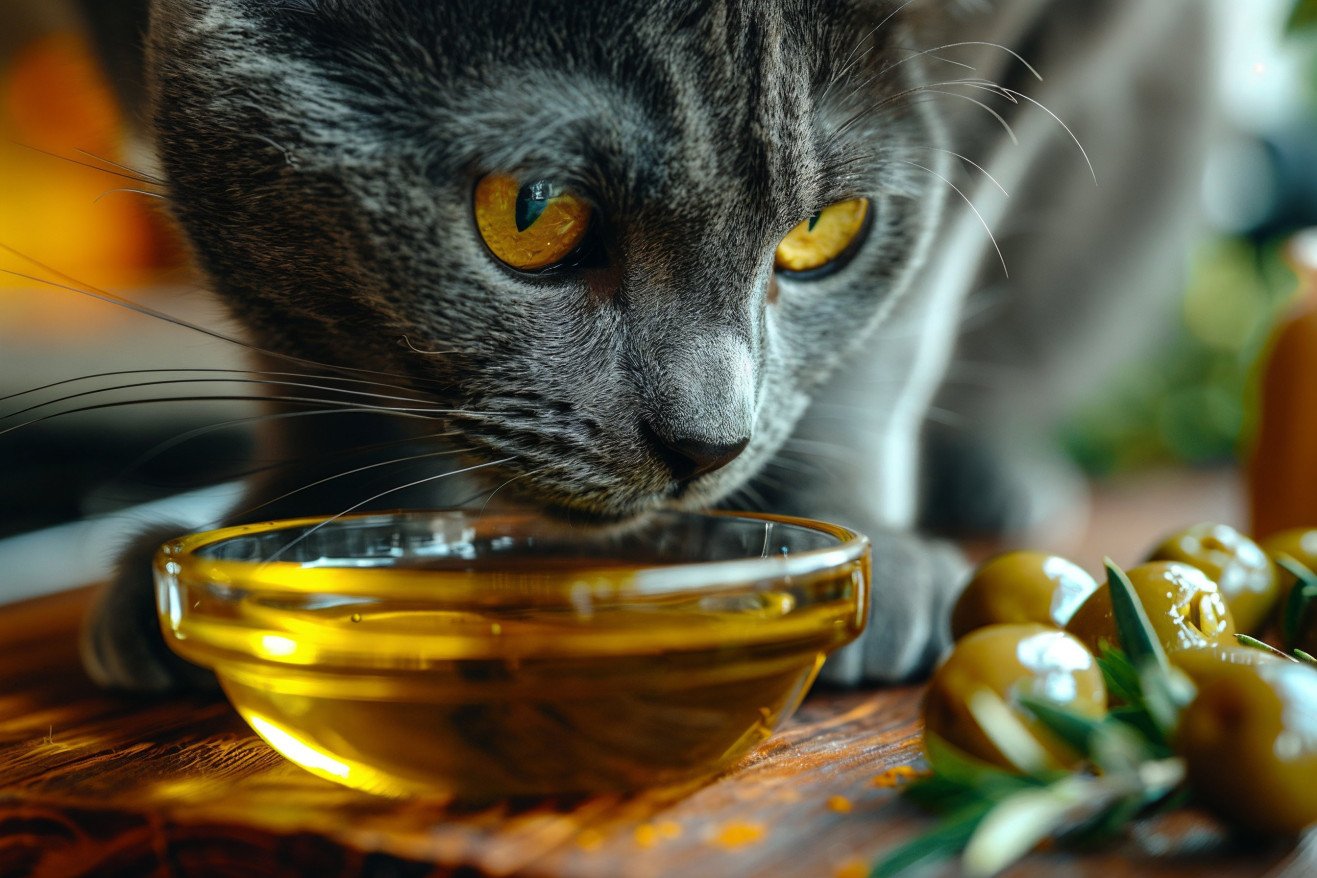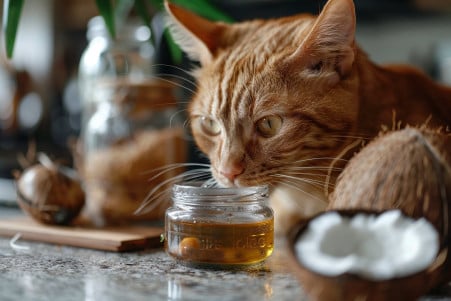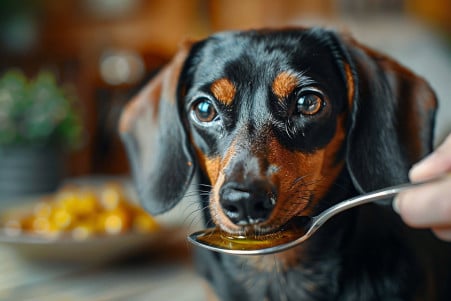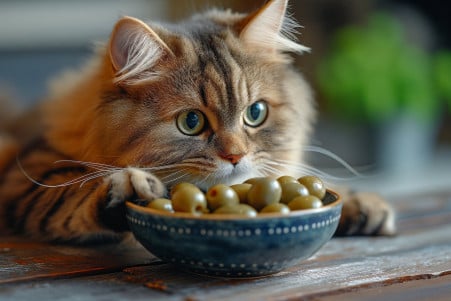Is Olive Oil Safe for Cats? What Are the Benefits and Dosage?
5 March 2024 • Updated 4 March 2024

Olive oil is a common ingredient in many human foods, but can you give it to your cat? The answer is yes, cats can have olive oil in moderation. It can help with digestion and hairball control. The recommended dosage for adult cats is about half a teaspoon. However, it’s important to talk to your vet before giving your cat olive oil to make sure it’s administered properly.
This article will review veterinary nutrition and animal healthcare research to evaluate the potential benefits and drawbacks of olive oil as a supplement for cats. To ensure a well-rounded view of how olive oil can affect cats, this study will reference original research, summarize other sources, and take into account expert perspectives. This will provide you with a deeper understanding of how to use and dose this popular cooking oil for your cats.
Is olive oil safe for cats?
Olive Oil’s Nutritional Profile and How It Affects Cats
Olive oil is high in monounsaturated fats, especially oleic acid, which helps cats maintain a strong immune system. According to Animal Wised, one tablespoon of olive oil contains about 119 calories and 14 grams of fat. This high caloric and fat content means that olive oil can be helpful, but it should be used in moderation to avoid causing obesity.
Polyunsaturated fatty acids, including linoleic acid, which is found in olive oil, can help improve a cat’s skin and coat health, according to Petside. These fatty acids can help improve skin moisture and make a cat’s coat shinier. Meanwhile, the antioxidants in olive oil, including vitamin E and polyphenols, can help improve a cat’s immune system and support brain health.
That said, it’s important to remember that olive oil shouldn’t replace the fats in commercial cat foods, which are designed to provide the right balance of nutrients for cats.
While there are some potential benefits, olive oil isn’t a miracle cure and should be used as a supplement to a cat’s diet rather than a replacement. When used in this way, olive oil can be a helpful addition to a cat’s diet, rounding out their nutritional intake without replacing other important nutrients.
How Much Olive Oil Should You Give Your Cat?
It is important to know the proper dosage of olive oil to give your cat in order to ensure that you are giving them enough to benefit them without giving them so much that it could cause health problems.
According to Selo Olive Oil, a good rule of thumb is to give adult cats between 1/2 to 1 teaspoon per day, although this amount can be adjusted based on the cat’s size, age, and health. It is always best to start with a lower amount to see how your cat responds.
Olive oil can be added to your cat’s food, but it is important to make sure that it is mixed in well so that your cat doesn’t eat around it, according to Aceites Betis Torres y Ribelles.
You should also think about how often you give your cat olive oil. To keep it in line with your cat’s regular diet, it is recommended that you add 1 teaspoon to their food 1–3 times a week, according to Animal Wised.
It is important to pay attention to how your cat reacts to the olive oil. If they are intolerant to it, they may experience diarrhea, skin rashes, or vomiting.
It is also important to talk to your vet before giving your cat olive oil, especially if they have a health condition, such as pancreatitis, that could be impacted by the addition of olive oil to their diet. With the right amount and proper supervision, olive oil can be a great addition to your cat’s diet.
Metabolic Impact of Olive Oil in Cats
If you are thinking about giving your cat olive oil as a supplement, it is important to know how cats metabolize the oil and how it might impact their digestion.
Cats metabolize fats differently at different life stages. A study on nutrient digestibility in cats fed different dietary fats found that cats metabolize olive oil, which is high in monounsaturated fats, differently than saturated or polyunsaturated fats.
Meanwhile, a study available on PubMed by S E Peachey found that senior cats are less efficient at digesting fats and energy than younger cats, regardless of the fat source in their diet. This means that cats metabolize fats, including the monounsaturated fatty acids in olive oil, less effectively as they get older, which could impact the ideal amount of olive oil in their diet.
The study also found that both young and old cats are less efficient at digesting saturated fats than other fats, which means that olive oil, with its higher monounsaturated fat content, may be a better source of dietary fat. However, it is important to note that these metabolic differences need to be taken into account, especially for cats with specific health issues or sensitivities.
The differences in fat metabolism with age highlight the importance of customizing dietary supplements to meet individual nutritional needs, which leads to a broader consideration of fats in feline nutrition.
What to Know About Fat in Cat Food
Fats are an important part of a cat’s diet, not only because they are a concentrated source of energy but also because they carry fat-soluble vitamins and essential fatty acids that are important for overall health.
PetMD explains that the essential nutrients for cats are protein, fat, vitamins, minerals, and water, and that the dietary energy comes from fats, proteins, and carbohydrates. The Association of American Feed Control Officials (AAFCO) requires a minimum of 9% crude fat in cat food, which is important for skin and coat health, as well as wound healing and inflammation control.
Most commercial cat foods contain a mix of animal fats that provide the omega-3 and omega-6 fatty acids that cats need, according to the Purina Institute. Olive oil, which also contains essential fatty acids, has a different fat profile. It is made up mostly of monounsaturated fats, which can be good for skin and coat health when used in moderation.
If you’re going to add olive oil to your cat’s diet, it’s important to do so carefully to avoid displacing important nutrients.
Because olive oil doesn’t contain all of the essential nutrients that cats need, it shouldn’t replace the specially formulated fats in commercial cat food.
It’s important to find the right balance because too much olive oil can lead to too many calories and potentially disrupt the careful balance of a nutritionally complete cat diet. However, when used carefully, olive oil can be used to supplement the fats in commercial cat food to promote overall health and make sure that cats are getting all of the essential nutrients they need in the right amounts.
The Bottom Line: Olive Oil Dosage Essentials
Olive oil can be a healthy addition to your cat’s diet, but it’s important to use it in moderation. While it can help with constipation and other digestive issues, it’s also high in calories and can lead to weight gain if your cat consumes too much. It’s also important to note that olive oil is not as high in omega-3 and omega-6 fatty acids as other oils, like fish oil and hemp oil.
That said, olive oil can be a good option for cats with sensitive stomachs, and it also has antioxidant properties due to its polyphenol and vitamin E content.
Olive oil is also lower in omega fatty acids than fish oil, which is high in EPA and DHA and has anti-inflammatory properties, according to Pet Food Processing. However, this can be a good thing if you’re looking for a way to add extra calories to your cat’s diet, especially if they’re underweight or have high energy needs.
As with any dietary oil, using olive oil to help manage your pet’s health issues requires a careful and informed approach. While it can be a helpful natural remedy for constipation and other issues, it’s important to use it in moderation to avoid obesity and other health problems.
Vets may also recommend specific oils, including olive oil, to help manage specific health issues, but it’s always best to use them as part of a comprehensive dietary plan.
Knowing the different benefits and drawbacks of various oils, including olive oil, can help you make the best decisions about your cat’s dietary supplements so that they help your pet’s health rather than hurt it.
Conclusion: Olive Oil and Your Cat’s Diet
In conclusion, when considering the impact of olive oil on a cat’s diet, it’s easy to see that this popular cooking oil can have a number of positive effects, including helping with digestion and promoting healthy skin.
However, it’s also important to remember that these benefits need to be balanced with the need for portion control. It’s important to use olive oil in moderation, and the recommended amounts are typically no more than a teaspoon per day for adult cats, although this can be adjusted based on the cat’s specific needs.
As with any supplement, it’s important to talk to your vet before adding olive oil to your cat’s diet to make sure it’s appropriate for your cat’s specific health needs. Pet parents should also make sure to do their own research and seek out professional advice, as the nutritional needs of cats can be very different.
While olive oil can be a healthy addition to a cat’s diet when used in moderation, it should be used to supplement the balanced fat intake that cats get from their commercial cat food, not replace it.
As our understanding of pet nutrition grows and we learn more about the impact of different supplements, olive oil will likely continue to be seen as a way to help improve a cat’s health when it’s used as part of a well-rounded diet.


